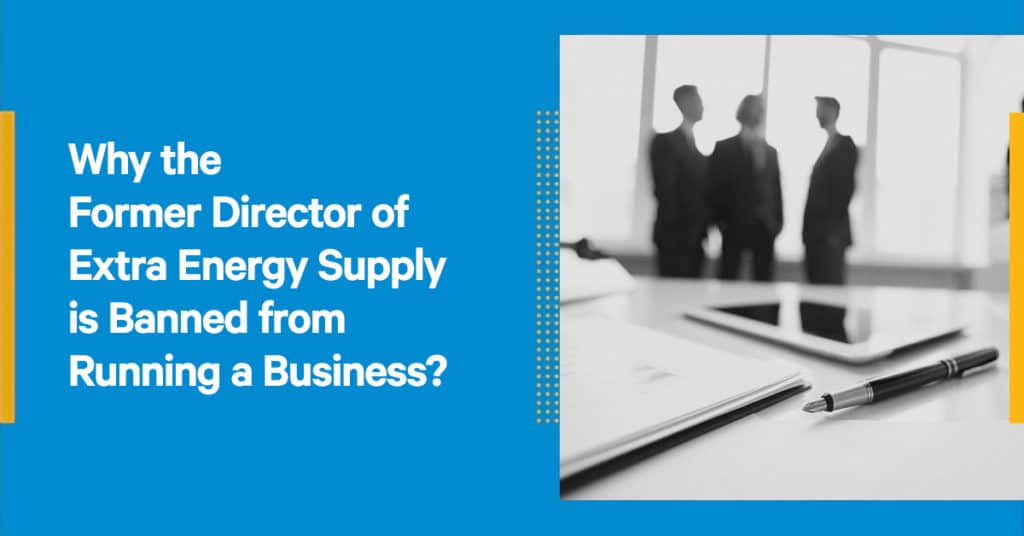As experts in liquidation and insolvency, we’ve witnessed various cases where directors face repercussions for mismanagement or regulatory non-compliance. A particularly notable case is that of the Former Director of Extra Energy Supply, Mordechay Maurice Ben-Moshe, who was recently banned from running a business for six years. This case offers crucial lessons for business directors and stakeholders.
Who were Extra Energy Supply?
Extra Energy Supply Ltd, trading as Extra Energy, was an independent energy supplier in the UK. Catering to domestic and small business customers with gas and electricity, it was a part of Extra Holding, a group involved in various sectors like telecoms, travel, insurance, and energy. Despite a modest customer base of 108,000 domestic and 21,000 business clients, the energy supplier ceased trading in 2018.
Background of Extra Energy Supply’s Collapse
Before delving into the specifics of the ban, it’s important to understand the context. Extra Energy Supply Ltd was a significant player in the UK energy market, supplying around 130,000 households and businesses. The company’s journey into administration marked a significant failure in the energy sector, particularly in terms of regulatory compliance and financial management.
The Role of the Former Director
The Former Director of Extra Energy Supply, Ben-Moshe, was at the helm during this challenging period. His role as a director was not just to steer the company towards profitability but also to ensure the industry regulatory framework was adhered to. This responsibility is a cornerstone of corporate governance, especially in a sector as critical and regulated as energy.
Regulatory Breaches and Mismanagement
Ofgem’s investigation into Extra Energy Supply unearthed worrying practices. Customers were reportedly hit with unexpectedly large bills, and the company’s approach to handling complaints fell somewhat short. The firm also owed a significant sum – £28.5 million – to Ofgem’s Renewables Obligation and Feed-in Tariff schemes. These schemes are vital for the UK’s shift towards sustainable energy, and compliance is non-negotiable.
The Insolvency Service’s Findings and Action
The Insolvency Service’s investigation concluded that Ben-Moshe breached his duties. This breach was not a minor oversight but a fundamental failure in ensuring the company remained compliant with essential regulations. This non-compliance led to substantial distress for customers and financial instability within the company.
The Significance of the Director Ban
The six-year ban handed to Ben-Moshe sends a clear message to directors across the UK. It highlights the gravity of directorial responsibilities and the consequences of neglecting them. The ban is not just a punitive measure but also a protective one, intended to safeguard the business community and consumers from potentially harmful business practices.
Lessons for Directors and Businesses
Directors and businesses need to learn the lessons from this case. It emphasises that directors’ duties are not solely about driving financial success but also about upholding ethical and legal standards. In sectors like energy, where the impact on public welfare is direct and significant, directors must act responsibly. This scenario serves as a reminder that neglecting regulatory compliance can lead to severe consequences, not just for the company but also for its customers and the broader community.
Directors must proactively stay informed about regulatory changes and understand the implications of these regulations on their operations. What’s more, it highlights the need for a strong internal culture of compliance and accountability. Businesses must prioritise robust internal controls and regular audits to adhere to legal and ethical standards. This proactive approach safeguards the company’s reputation and helps to maintain its long-term sustainability in an increasingly regulated and scrutinised business environment.
The Role of Insolvency Practitioners
The role of insolvency practitioners extends far beyond administration in the aftermath of a company’s failure. In situations similar to that of the Former Director of Extra Energy Supply, we delve deeply into the company’s operations to uncover the underlying reasons for its downfall.
This investigative process often reveals systemic issues, ranging from poor financial management to non-compliance with regulatory standards. Our comprehensive analysis provides critical insights that can guide regulatory bodies in tightening oversight mechanisms. We also play a pivotal role in advising and guiding other businesses to adopt more sustainable and ethical practices, preventing similar scenarios from occurring. By highlighting these issues and providing targeted recommendations, insolvency practitioners contribute significantly to improving corporate governance and accountability across various industries.
Moving Forward: Compliance and Corporate Responsibility
The case of Extra Energy Supply Ltd is a cautionary tale for businesses in the UK. It highlights the need for robust compliance mechanisms and a culture of corporate responsibility. Directors must prioritise these aspects to ensure the sustainable success of their companies and the protection of consumer interests.
Ben-Moshe’s ban serves as a reminder of the responsibilities of the directorial position. It’s a wake-up call for directors across sectors to ensure regulatory requirements are met, and the highest standards of corporate governance are upheld. As the business environment becomes increasingly complex, lessons such as this become essential for the health and integrity of the business landscape.
Seek Expert Advice
The case of Extra Energy Supply and its former director highlights the relationship between corporate governance, regulatory compliance, and the role of directors in safeguarding the interests of both businesses and consumers. In light of the complexities and challenges outlined in the case of Extra Energy Supply, it’s clear navigating insolvency and regulatory compliance can be daunting.
This is where our team can help. We offer tailored advice to find the best insolvency solution for your unique needs. Our Insolvency Practitioners, accredited by the Institute of Chartered Accountants in England and Wales, provide free, impartial advice to ensure the most cost-effective liquidation of your business. Reach out to us using the form below, connect via live chat, email us at mail@Simpleliquidation.co.uk, or call us at 0800 246 5895. We’re here to help you every step of the way, offering expert guidance to safeguard the future of your business.




